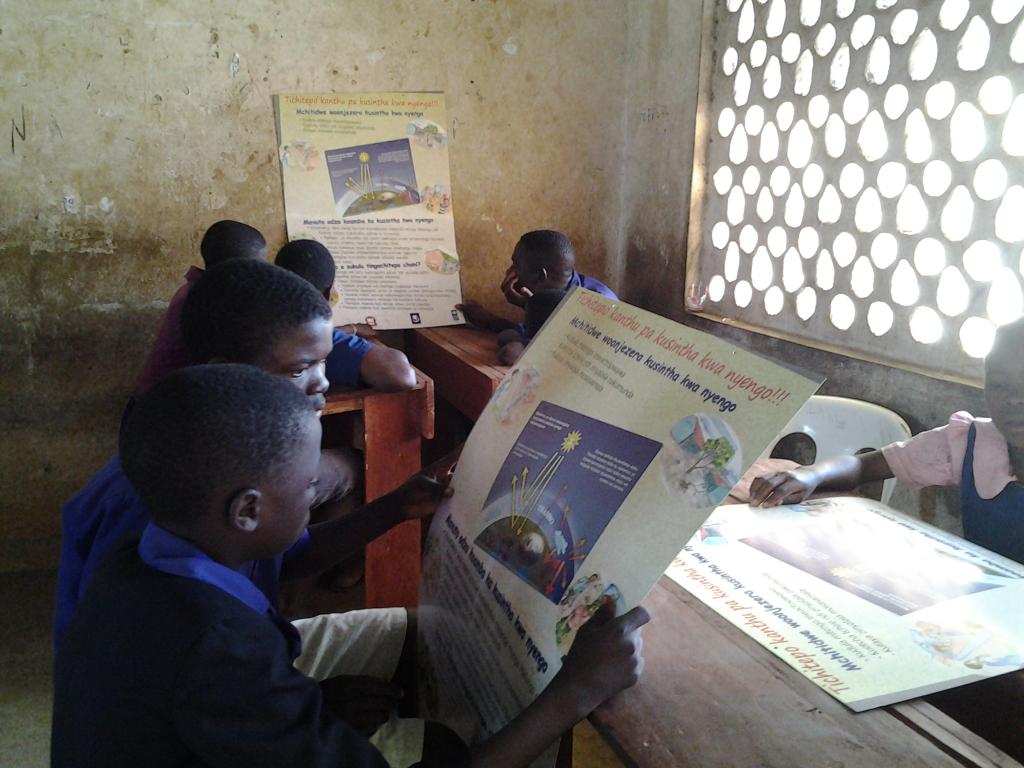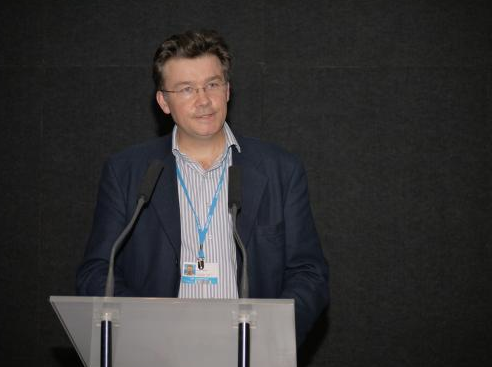A Global Partnership for Knowledge Sharing: An Interview with UNITAR’s Angus Mackay
Mr. Angus Mackay, Head of the UN CC:Learn Secretariat, talks about UN CC:Learn during an interview with journalist Jason Schwartz at COP21. The article is originally published on the CEB Secretariat website.
13 January, Paris, France - Talk about climate change tends to focus on carbon emissions, adaptation projects, finance, or effects on ecosystems. However the importance of knowledge and skill-sharing cannot be overstated. If we are to lessen the impacts of climate change and protect our societies and ecosytems, we are going to have to get a lot better at distributing understanding and solutions. The UN Institute for Training and Research (UNITAR) has been working tirelessly to do just that, by working directly with national education ministries, training teachers, and providing access to a library worth of resources on climate change. UNITAR also provides the Secretariat for One UN Climate Change Learning Partnership, or UN CC:Learn, which involves 34 multilateral institutions in the development of national-level climate change education programs. Jason Schwartz, journalist working with the CEB Secretariat, sat down with the manager of UNITAR’s Climate Change Program, Angus Mackay.

UNITAR has organized a huge collaborative network of UN organizations under the banner of UN CC:Learn, or the One UN Climate Change Learning Partnership. Can you discuss its inception?
UN CC:Learn was born in Copenhagen, even though education and training were not on the agenda. Meanwhile, the UN System was already doing well on collecting knowledge about climate change. It’s just that it was scattered and dispersed. So the initial idea was: how do we find a single entry point into the UN for somebody keen to develop their skills and knowledge on climate change. We wanted to establish a global partnership to support knowledge sharing, promote the development of common climate change learning materials, and coordinate leaning interventions through collaboration of UN agencies and other partners.
So it just developed organically?
Still, we had to find funding. We started with small amounts available from within the UN, but then the Swiss Development Corporation really got what we were doing from the start - we were trying to build global knowledge and skills, and we were aiming to help the poorest and vulnerable countries first. The important thing is that we trying to help countries to be organized about knowledge and skills for climate change. We help countries to organize skills development in a recurrent and systematic way; not ad hoc. Above all trainings for the development and implementation of national strategies must be relevant to each countries plans and priorities.
What is your role?
I manage the climate change initiatives of UNITAR. It’s a good model because we don’t purport to be the experts on climate change. We are the training experts - making sure that new knowledge is presented so that people are likely to remember it, and use it. This can be done face to face or through distance learning, and frequently a combination of the two. The power of UNITAR is that we have direct access to all the technical experts we need to within the UN system; to bring in the knowledge. Want to know about health? We go to the WHO. Food security? FAO and the World Food Programme. Climate science? UNEP and the World Meteorological Organization.
How do you work with governments at the national level?
The first thing we try to do is provoke a national discussion. For example we try to bring in the ministry of education to have a conversation about climate change, even though its not common for them to be involved in climate change. But we don’t stop there. We bring in other sectors too: agriculture, energy, transportation, water. We have a proper dialogue on the learning priorities and help to develop what we call a national climate change learning strategy. The second step is to reach out to all partners to support the strategy. We try to engage the national budget, development partners, as well as UN CC:Learn funding, to see just how much we can do.

Does the project’s work have pathways to be integrated into national plans?
Take the Dominican Republic - the country has been really been a key partner. We worked with the National Council on Climate Change and through them the national teacher training institute (INAFOCAM) to build teachers’ knowledge and methods for the classroom on climate change - how to produce teaching materials, how to introduce climate change to various age groups, how to engage students in projects. Initially only a few hundred teachers were trained. Then, the government decided that it wanted to train all the school teachers in the country, funded by The Ministry of Education. They’ve made huge progress already..
What about other regions?
We’ve yet to find the country that hasn’t embraced the idea of developing more systematic education and training on climate change. In East Africa we have projects in Ethiopia, Malawi and Uganda, in West Africa we are working with Benin, Burkina Faso, Ghana and Niger. These are all vastly different places, so it takes a lot of time and work. A national project generally takes about 8-12 months to launch and could take 3-5 years to fully implement.
What brings you to the work?
I love the idea that there is an institution within the UN that focuses on the way people learn. I find inspiring the fact that at UNITAR we focus on producing learning which aimed to reach at reaching people’s long term memory, particularly on such a major issue as climate change. I mean, we are a drop in the ocean, but what keeps me going is the belief and hope that we can really scale this thing up.
To access the article on the CEB website, please visit: http://unitednationssystemcop21.tumblr.com/post/136271835360/a-global-partnership-for-knowledge-sharing-an
About UN CC:Learn
UN CC:Learn is a partnership of more than 30 multilateral organizations supporting countries to design and implement systematic, recurrent and results-oriented climate change learning. At the global level, the partnership supports knowledge-sharing, promotes the development of common climate change learning materials, and coordinates learning interventions through a collaboration of UN agencies and other partners. At the national level, UN CC:Learn supports countries in developing and implementing national climate change learning strategies. Through its engagement at the national and global levels, UN CC:Learn contributes to the implementation of Article 6 of the UNFCCC on training, education and public awareness-raising, and the 2012-2020 Doha Work Programme. Funding for UN CC:Learn is provided by the Swiss Government and UN partners. The Secretariat for UN CC:Learn is hosted by the UN Institute for Training and Research (UNITAR).
Picture 1: Students in Malawi
Picture 2: Angus Mackay, Head of the UN CC:Learn Secretariat

